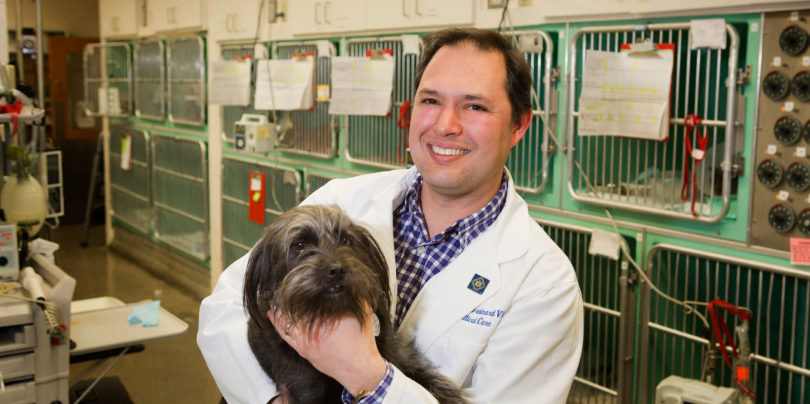Benjamin Brainard, associate professor in the College of Veterinary Medicine, impresses upon students that responsibility to animals and their owners, to co-workers and to colleagues is a prerequisite to a successful career as a veterinarian.
Where did you earn degrees and what are your current responsibilities at UGA?
My undergraduate degree is from Dartmouth College, and my veterinary degree is from the University of Pennsylvania. My residencies in veterinary emergency and critical care and veterinary anesthesia also were completed at the University of Pennsylvania. I am currently an attending veterinarian in the intensive care unit and emergency room of the University of Georgia Veterinary Teaching Hospital and an associate professor in the department of small animal medicine and surgery.
When did you come to UGA and what brought you here?
I was actually an intern in small animal medicine and surgery in 2000; I enjoyed my time here so much that I jumped at the opportunity to return and help start the critical care program in the College of Veterinary Medicine. The quality of the veterinary hospital, veterinary education and the research opportunities at the university were huge draws.
What are your favorite courses and why?
My favorite course is our clinical rotation in emergency and critical care, SAMS 5490. The clinical year is the culmination of three years of mostly didactic teaching, where students finally have the chance to put everything together as they help care for animals in the hospital. Clinical medicine integrates all of the physiology, pharmacology and pathology in a real patient, and it is very rewarding to see everything ‘click’ when students see the real-life manifestations of disease and the effect of appropriate therapy.
What interests you about your field?
Anesthesia and critical care are science and physiology in action. We use drugs and therapies that immediately affect how the cardiovascular, pulmonary or other organ systems work. Seeing these changes happen in real time, you just have to stand back in awe realizing how everything is connected. And platelets, the cause of—and solution to—many of our problems in critical care, are the most fascinating cell in the body, with the possible exception of the vascular endothelium. Although we see many cases of the same disease, no two patients are exactly alike, and each patient merits tailored therapy.
What are some highlights of your career at UGA?
Receiving an award last year from the graduating seniors for my clinical teaching was a huge highlight, since the students are really why I’m here! The development of a critical care program with my colleague Dr. Amie Koenig has been a tremendous project over the past seven years. To hear from our colleagues that people are now applying for our advanced critical care training because they have heard about the quality and success of our program is a tremendous achievement, and we hope to continue to build on this success. The opportunity to be part of a multidisciplinary team from UGA and Zoo Atlanta that traveled to Cameroon in March 2013 was a wonderful experience. On that trip, we anesthetized more than 40 gorillas and chimpanzees in a wildlife refuge to study their cardiac function in an attempt to improve heart health in great apes in U.S. zoos.
How does your research or scholarship inspire your teaching, and vice versa?
Coagulation and platelet function are endlessly fascinating topics. I sometimes lie awake at night thinking about platelets. Now that I’ve said that, I’m not exactly sure how infectious that excitement is (believe me, I try). However, medicine is about having a certain level of excitement about how body systems work in health and disease, and I hope that my students will choose their own favorite area of physiology to obsess about at night. For me, a strong understanding of the physiology behind clinical syndromes is crucial to a balanced approach; understanding the clinical signs of bleeding in an animal, for instance, will immediately inform the initiating cause, therapy and the required diagnostics. I’m sure some students tire of hearing me bring up first-year biochemistry or physiology, but hopefully in five years they’ll figure out it wasn’t just trivia.
What do you hope students gain from their classroom experience with you?
I don’t do much classroom teaching, but I do a tremendous amount of clinical teaching. One thing that I hope students learn is the appropriate approach to emergency cases. People are very nervous about seeing emergency cases because it requires rapid assessment and decision-making, and we see some very sick animals. I hope to convey that you can accomplish more by being calm and working through a case in a step-wise fashion than becoming paralyzed by fear or anxiety. After all, emergency cases are the same physiology as other cases, just taken to an extreme. Hopefully after they’ve had a couple of emergency shifts, students find that appropriate and timely triage, stabilization and diagnosis of problems is quite a rush.
Describe your ideal student.
Curiosity is essential. The ideal student has a true desire to diagnose and treat the animals in the hospital and can accomplish this as part of a team that includes everyone in the hospital. Responsibility to the animals and their owners, to co-workers and to colleagues is a prerequisite to a successful career as a veterinarian.
Favorite place to be/thing to do on campus is…
I enjoy visiting the Georgia Museum of Art. Even though people sometimes draw a separation between art and science, the reality is that you can’t have one without the other. You need to nurture both sides of your brain. Music is good as well; the music in town and the visiting artists to the Performing Arts Center are great.
Beyond the UGA campus, I like to…
Go hiking with the dogs in the North Georgia mountains.
Favorite book/movie (and why)?
“The Crying of Lot 49” by Thomas Pynchon remains my favorite, for its simplicity and intrigue. Jeffrey Eugenides writes beautiful sentences. Georges Perec’s “Life: A User’s Manual” is brilliantly constructed, and he had some excellent hair.
Proudest moment at UGA?
Our residents in emergency and critical care sign up for three years of intensive training in veterinary critical care at UGA. This is a huge investment of time and effort, and it represents three additional years following four years of veterinary school and one year of internship. At the end of their training, there is a comprehensive two-day exam, successful completion of which confers diplomate status in the American College of Veterinary Emergency and Critical Care. So far, we have a 100 percent pass rate for our first three residents in critical care at UGA, and having these doctors as critical care colleagues and listening to their experiences following residency makes me proud to have been a major part of their training.
(Originally published April 6, 2014)








